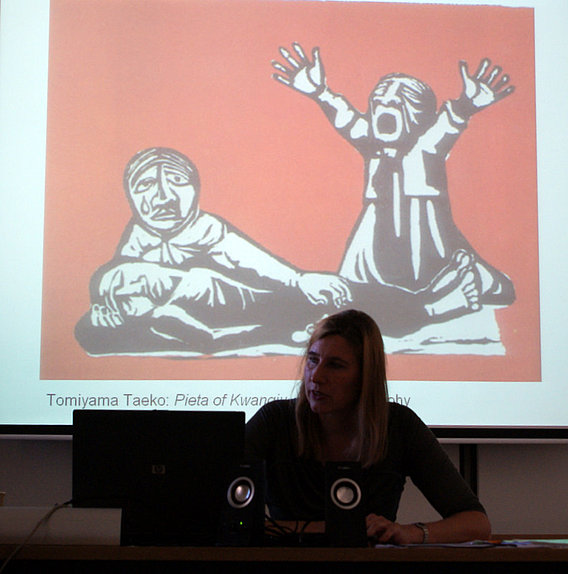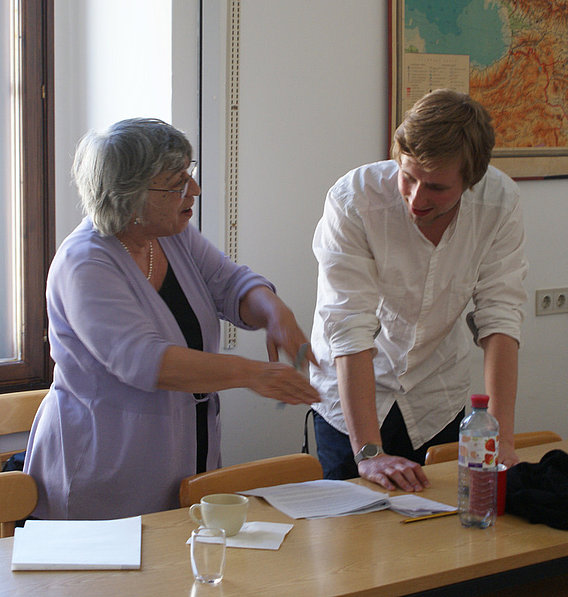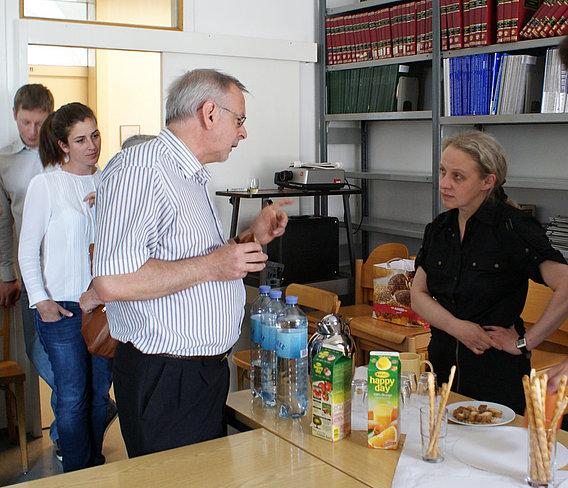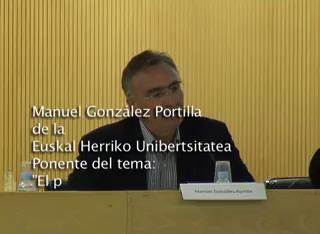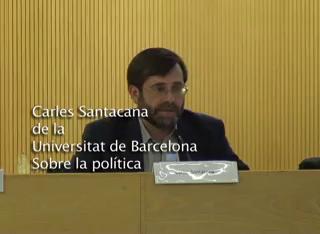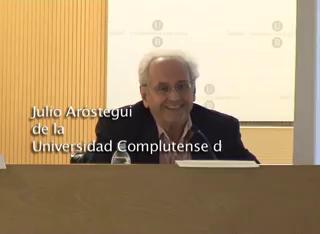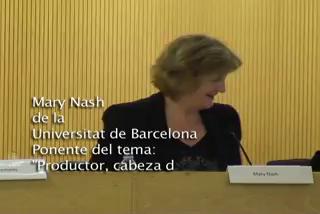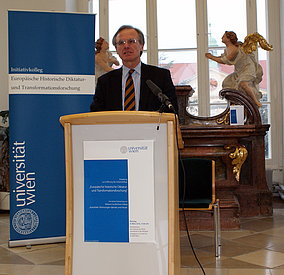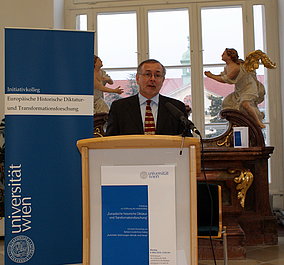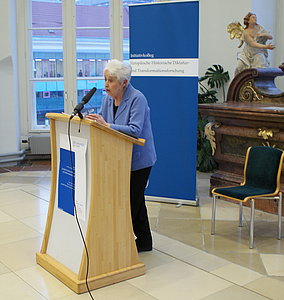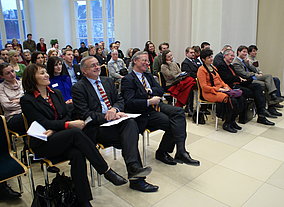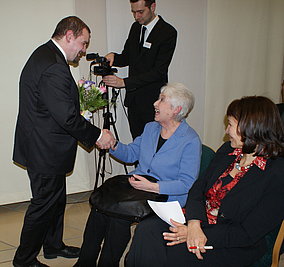Workshop „Visual History / Visual Culture“
In the frame of the workshop series organized by the Doctoral College the third workshop “Visual History / Visual Culture” took place on 26-27 May, 2011.
The workshop aimed to explore the social, political and cultural function of images. Correlation and interaction between visual media and power were examined by identifying diverse ways of how pictures are used in order to represent political power as well as to construct national identity, historical narratives and national myths.
We would like to thank most sincerely our guest lectures Ms. Prof. Birgit Mersmann, Ms. Prof. Almira Ousmanova, Ms. Prof. Tasoula Vervenioti, Sandra Grether and Benedikt Vogeler.
Workshop „Authoritarian regimes and inter-war Europe: Austria under Dollfuss/Schuschnigg, Gömbös-Hungary during the Horthy-Era and Salazar’s Estado Novo. Comparison, Memory, Continuities“
From March 17 - 18, 2011, the first of so far four projected workshops organized by the Doctoral College „European Historian Dictatorship and Transformation Research“ took place.
António Costa Pinto from the Institute of Social Science of Lisbon University, the Austrian political scientist Anton Pelinka, currently teaching at the Department of Political Science of the Central European University Budapest and the historian József Vonyó from the University of Pécs (who due to health reasons was not able to take part in the workshop himself) kindly accepted the College’s invitation to present and discuss their papers treating the topic „Authoritarian regimes and inter-war Europe: Austria under Dollfuss/Schuschnigg, Gömbös-Hungary during the Horthy-Era and Salazar’s Estado Novo. Comparison, Memory, Continuities“.
Focussing on the structures of power of authoritarian regimes of inter-war Austria under Dollfuss/Schuschnigg, of Gömbös-Hungary during the Horthy-Era and, respectively, of Salazar’s Portugal during its phase of consolidating the so called Estado Novo until the end of World War II, these regimes were discussed in a comparative way. Similarities and differences of political structures and ideological sources of these political systems were worked out.
Main questions of the workshop’s research-interest, addressed by the speakers and analyzed in a more detailed and controversial way in a discussion afterwards, were in which way and to which extent Italian fascist ideology (above all regarding the establishment of corporatist structures) and/or the Catholic Church influenced ideologies and political developments of the regimes in question.
Furthermore, (dis-)continuities, political heritages of and intentional references to these dictatorships in today’s Austrian, Hungarian and Portuguese societies and political systems, respectively, were identified and analyzed, considering also the growing strength of right-wing tendencies in Europe these days.
Lecture and Discussion with Prof. Herlinde Pauer-Studer: „Transformations of Normativity: The National-Socialist Regime from the Viewpoint of Moral Philosophy“, on June 28th 2010
Prof. Pauer-Studer from the Department of Philosophy of Vienna University presented her interdisciplinary research (a cooperation with New York University) combining historical science and philosophy. She pictured the distortion, imitation and caricature of moral action in the National-Socialist Regime. From a philosophical viewpoint it does not make sense to transfer the latter into the sphere of the metaphysically incomprehensible far from all morality, says Pauer-Studer. The Nazi-Regime was not amorality in the classical sense but a way of normative deformation. It used particular moral an ethic elements to justify itself, whereas other essential elements of morality – such as forbidding to kill - where left aside.
Dr. Eveline List and Peter Angerer: lecture and discussion in the Doctoral College on June 14th 2010
Dr. Eveline List is historian and psychoanalyst and teaches at Vienna University at the Departments of History and of Political Science. At the present occasion she lectured on the dynamics of mass psychology and its effects on dictatorships. Peter Angerer presented his master thesis research “Emergence, Mechanisms of Government and Stability of the Stalinist State and their (Mass-) Psychological Preconditions”. These lectures constituted a most valuable incitement for the Doctoral College Fellows towards a different kind of dictatorship research – from a psychoanalyst point of view.

International Congress: THE FRANCOIST DICTATORSHIP: The institutionalization of a regime - Barcelona, April 21st – 23rd , 2010
Click -here- for the complete Conference report in German.
Some selected videos of the lectures of the Speakers in the Conference in
Catalan und Spanish:
The Opening Ceremony on March 8th 2010
On March 8th 2010 the Doctoral College European Historical Dictatorship and Transformation Research had its ceremonial opening. In the presentable old chapel of the Vienna University Campus in front of an audience of about 70 listeners rector Georg Winckler expressed his satisfaction with doctoral “cohorts” employed at the university. Oliver Rathkolb, head of Department for Contemporary History at Vienna University and Speaker of the Doctoral College, introduced the work of the group and its faculty asking the doctoral fellows to introduce themselves to the audience. At this occasion the fellows gave their thanks to the faculty of the College for its professional scientific support. Central part of the ceremony was the guest lecture of the long-standing political journalist Barbara Coudenhove-Kalergi who presented most interesting thoughts on Authoritarian Movements Then and Now. The guest lecturer sketched the socio-political and economic background of the calamitous European dictatorships in the 20th century and pointed out the danger which the current economic crisis (which in Coudenhove-Kalergi’s view has lead to a political crisis already) encompasses for society as it may well lead to renewed authoritarianism. Ms. Coudenhove-Kalergi sees it as a good sign that the Doctoral College invited herself - a journalist - as a guest lecturer to its opening: the College will not limit its scientific findings and conclusions to the academic world, but will be in contact with a wide public and be a merit to society as a whole.
After the official speeches a reception was made at the Doctoral College’s premises where visitors were presented the nine fellows’ research projects on especially generated presentational posters.
It was a great opening followed by surely great work in the next three years of College-duration!
University of Vienna
Spitalgasse 2-4, Hof 1
A-1090 Vienna

